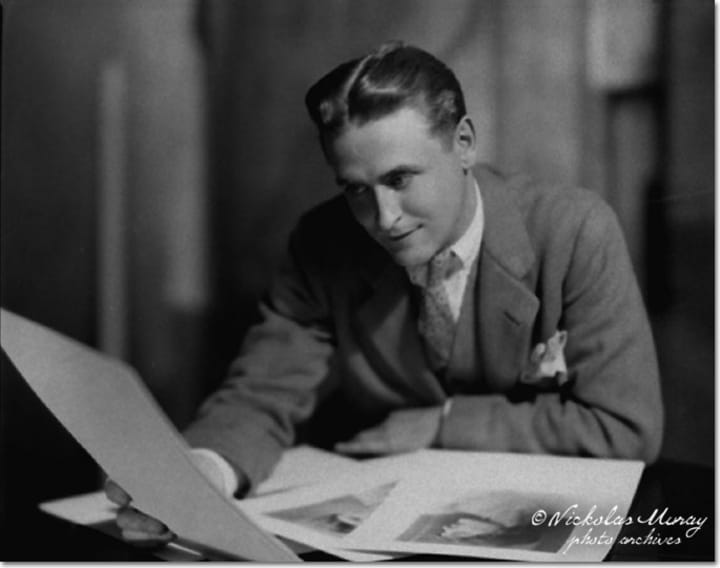Beer and Loathing At The Grove Park Inn
F. Scott Fitzgerald’s Hazy Summers in Asheville, North Carolina

In summers of 1935 and ‘36, F. Scott Fitzgerald dragged his broken body and cracked-up mind to Asheville’s Grove Park Inn—a mammoth structure made of stone that played host to everyone from World War II diplomats to Harry Houdini.
The troubled jazz-age author came here looking for R&R—ironically, in a room located right across the valley from where his wife, Zelda, was a patient in a psychiatric facility.
A Broken Writer Tries To Repair Himself

Fitzgerald stood barefoot in his swim trunks. He stood fifteen-feet above the pool, removed his shirt, tossed it to the lawn, and flexed his knees into the diving board, bounding off the edge and into the clear blue sky. For a moment, he assumed the textbook diver’s form known to all Princeton lads and high-society types. His slender frame knifed through the humid air down to the murky water below where a sudden crack was followed by an unusual ripple across the water’s surface.
Having just recovered from Tuberculosis, Fitzgerald had hoped a healthy swim might restore his vitality. Instead, the author pulled himself out of the pool realizing he had injured his shoulder. At least that was the story he would tell his nurse, his editor, and any newspaper writers who snooped around the hotel attempting to catch him on another bender.
Was it the dive into the pool that had caused a bone in his shoulder to crack? Or his many dives into the bottle the night before, when, raging against the phantoms in his mind that told him he was washed up—a failure. He tripped on his bathrobe and fell on the cold tile, crawling to the phone to call for help, only to catch a cold from being soaking wet for so long. As he spent the next three days in bed and several months in a cast, he dreamt the devil was there with him. Only the ghosts of Grove Park could know for sure.
The Getaway
F. Scott Fitzgerald rented two rooms at the inn, overlooking the entrance. In order to try and stop drinking gin, he decided to use this time to try “the beer cure,” his self-prescribed method of downing fifty-six pony bottles of beer a day.
He drank by his window and watched the steady stream of summer girls emerge from fancy cars that pulled up to the hotel entrance. Their summer dresses billowing in the mountain breeze became his new muse—even while his wife received daily shock treatments at a mental facility across town.
These were dark days for the Fitzgeralds who only a few years earlier had been the toast of the "roaring twenties." F. Scott Fitzgerald had partied and lived a life of privilege not unlike his most famous character, Jay Gatsby.
But after sales of his next novel, “Tender Is the Night” sagged, all he was left to show for his decade of excess was a wife who went nuts and a mountain of debts. So he decided to retreat far from his demanding publishers and debt collectors and came to an inn in the foothills of the Blue Ridge Mountains that had a reputation for hosting famous guests discretely.
At first, his plan to remain anonymous and get some writing done worked. The other guests in the hotel dining room could care less about who he was. It had been years since he and Zelda had dominated the gossip columns with their society parties that often ended with them drunk and swimming in someone's fountain.
The Press
Fitzgerald was physically and emotionally beat up. “One blow after another...finally something snapped,” is how Fitzgerald himself described it to Michael Mok, the New York Post reporter who came to interview the writer during his self- imposed exile. Fitzgerald had called the journalist, hoping a profile would restore his image and help sell more novels. He needed the press to tell the world he wasn’t a has-been.
What happened during Mok's visit became one of the worst public relations turns in celebrity history. Mok's piece was so critical of Fitzgerald's erratic behavior, bruised ego, and fragile psyche that Fitzgerald fished the gun he had brought out of the drawer and attempted suicide shortly after reading it. Fortunately, the nurse that had been hired to mind him, locked up the pistol and put him on a 24-hour death watch instead.
The Affair
It wasn't all broken bones and spirits while Fitzgerald did everything but settle down to work at Grove Park. He also found a young woman in the dining hall who did recognize him and had actually liked his last novel.
Despite the fact that she was waiting for her husband to join her in a few days (or perhaps because of that fact) Fitzgerald seduced her and the two had a torrid affair.
While she dreamed about telling her friends how she had slept with the writer of "The Great Gatsby," Fitzgerald sat up at night fantasizing how he would confront the woman's husband. He played the scene out in his head as if it took place in one of his stories. He imagined the shock and anger on the young husband's face. The panic and nerves of the young woman as Fitzgerald squared off with the husband. The physical altercation that would ensue. Instead, when the day came and the husband finally arrived, the guilt-ridden woman broke the news and the man barely flinched. Apparently, his time away had revealed that he was no longer in love with her and he said that Fitzgerald could have her.
Fitzgerald, who was in love with the drama of the affair and not the woman, didn't want to have anything to do with her once the husband knew and didn't care. And so, the affair ended—not with fists, but with shrugs and awkward silences. Another encounter that Fitzgerald had failed to calculate properly.
The Return

For some strange reason, and probably at the Inn's concern after all of the headaches he had caused the previous summer, Fitzgerald returned to the Grove Park Inn in 1936.
This time, he settled down and actually did some writing. He hired a young stenographer to take down the stories as he dictated them to her. She had been warned about his behavior, but to her surprise, he was nothing if not a perfect gentleman to her.
She was smart, funny and a good conversationalist. Fitzgerald enjoyed her company, and even let her take the gin bottle away when she saw he was starting to consume more than his daily allowance.
The Comeback
After publishing a few well-received essays he had written in his Grove Park room, Fitzgerald started to get his old confidence back.
He began to dream of a second chapter to his career—only this time, he would resurrect it in Hollywood, as a big-time screenwriter for the studios.
He wrote a letter to the nurse who had mended his broken shoulder and kept him from killing himself, I’ve had a strange two months trying to pull together the fragments of a lost year and I wonder if life will ever again make much sense… I wonder if you are happier—somehow you seemed so when I saw you, even to my alcoholic eye. God, I hope so—it was sad to see anyone so young and with so much stuff in such a state of depression. I wish I could have helped you as you tried to help me. Anyhow I want to see you…
The writer John Dos Passos wrote to him after reading his essay "The Crack Up" in Esquire and hearing about his broken shoulder. He wrote, Why Scott—you poor miserable bastard, it was damn handsome of you to write me. Had just heard about your shoulder and was on the edge of writing when I got your letter. Must be damned painful and annoying. Let us know how you are. Katy sends love and condolences. We often talk about you and wish we could get to see you. He tried to encourage Fitzgerald to write a first-rate novel about everything he was going through.
Fitzgerald really knew he was getting his mojo back when he wrote a letter to Thomas Wolfe, telling the successful writer everything that he found wrong with Wolfe's writing and telling him to become "a more conscious artist." To Wolfe's credit, he took the criticism in stride, writing his own complimentary, if not surprised, letter in return.
Fitzgerald left the Grove Park for good at the end of that summer. He had visited Zelda a few times and felt that she was getting better (she would actually die in a fire in the mental hospital while remaining a patient there until 1948).
After his lost year bookended by the purgatory of his two boozy summers in Asheville, F. Scott Fitzgerald's foray into Hollywood wouldn't go that well either. He struggled to adjust to the more visual screenplay form, but the experience did inspire his final great unfinished novel "The Last Tycoon." A story full of fascinating characters and set against the backdrop of Hollywood's golden era, it contains fleeting passages of staggering truth and beauty and proved that Fitzgerald was one of the great writers of his generation.
About the Creator
Brendan Blowers
Brendan is a former writer for Haute Living and current contributing editor to atHome magazine. He also manages communications for a Southeast-leading architecture and design firm.






Comments
There are no comments for this story
Be the first to respond and start the conversation.